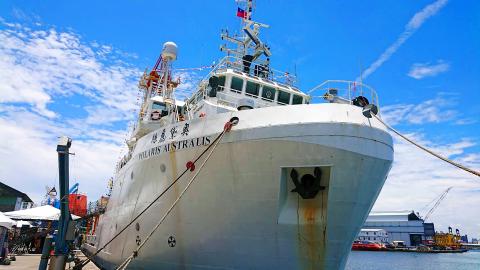Taiwan’s first locally designed and built drilling vessel, the Polaris Australis, was yesterday revealed at the National Kaohsiung University of Science and Technology’s Cijing campus.
Copenhagen Infrastructure Partners K/S (CIP) and Dragon Prince Hydro-Survey Enterprise Co (銓日儀) unveiled the vessel, which cost about NT$500 million (US$15.87 million) and was jointly funded by Dragon Prince and Pan Formosa Engineering Co (環島工程).
Dragon Prince said that construction of the vessel, which was designed by Jong Shyn Shipbuilding Co (中信造船), was completed at the end of last year.

Photo: Huang Pei-chun, Taipei Times
University vice president Yu Ker-wei (俞克維) said that the institute provided training to the vessel’s crew.
CIP Taiwan also provided training by foreign experts on several areas throughout the vessel’s construction, project office director Marina Hsu (許乃文) told the Taipei Times by telephone.
The training program spanned three months, and included courses on equipment calibration and dynamic positioning as well as health, safety and environmental regulations, Hsu said, adding that local companies often fail to conform to such requirements.
“This is a very special case,” Hsu said of the risk that the companies faced in building the vessel.
“Normally a company would start building a vessel once it has at least five orders,” Hsu said.
However, Dragon Prince and Pan Formosa launched the project even though they did not have a single order, she said.
CIP has placed an NT$80 million order with Pan Formosa to use the vessel in its drilling trials starting this month off Changhua County to install pipelines for its planned wind farms.
Local companies are willing to take risks by betting on the success of such projects, Hsu said, adding that the government should provide more support in areas such as finance and negotiations to accelerate the localization of the wind power industry supply chain.
The government has banned foreign vessels from drilling the seabed within the nation’s territorial waters, citing security concerns.

CHIP RACE: Three years of overbroad export controls drove foreign competitors to pursue their own AI chips, and ‘cost US taxpayers billions of dollars,’ Nvidia said China has figured out the US strategy for allowing it to buy Nvidia Corp’s H200s and is rejecting the artificial intelligence (AI) chip in favor of domestically developed semiconductors, White House AI adviser David Sacks said, citing news reports. US President Donald Trump on Monday said that he would allow shipments of Nvidia’s H200 chips to China, part of an administration effort backed by Sacks to challenge Chinese tech champions such as Huawei Technologies Co (華為) by bringing US competition to their home market. On Friday, Sacks signaled that he was uncertain about whether that approach would work. “They’re rejecting our chips,” Sacks

NATIONAL SECURITY: Intel’s testing of ACM tools despite US government control ‘highlights egregious gaps in US technology protection policies,’ a former official said Chipmaker Intel Corp has tested chipmaking tools this year from a toolmaker with deep roots in China and two overseas units that were targeted by US sanctions, according to two sources with direct knowledge of the matter. Intel, which fended off calls for its CEO’s resignation from US President Donald Trump in August over his alleged ties to China, got the tools from ACM Research Inc, a Fremont, California-based producer of chipmaking equipment. Two of ACM’s units, based in Shanghai and South Korea, were among a number of firms barred last year from receiving US technology over claims they have

It is challenging to build infrastructure in much of Europe. Constrained budgets and polarized politics tend to undermine long-term projects, forcing officials to react to emergencies rather than plan for the future. Not in Austria. Today, the country is to officially open its Koralmbahn tunnel, the 5.9 billion euro (US$6.9 billion) centerpiece of a groundbreaking new railway that will eventually run from Poland’s Baltic coast to the Adriatic Sea, transforming travel within Austria and positioning the Alpine nation at the forefront of logistics in Europe. “It is Austria’s biggest socio-economic experiment in over a century,” said Eric Kirschner, an economist at Graz-based Joanneum

OPTION: Uber said it could provide higher pay for batch trips, if incentives for batching is not removed entirely, as the latter would force it to pass on the costs to consumers Uber Technologies Inc yesterday warned that proposed restrictions on batching orders and minimum wages could prompt a NT$20 delivery fee increase in Taiwan, as lower efficiency would drive up costs. Uber CEO Dara Khosrowshahi made the remarks yesterday during his visit to Taiwan. He is on a multileg trip to the region, which includes stops in South Korea and Japan. His visit coincided the release last month of the Ministry of Labor’s draft bill on the delivery sector, which aims to safeguard delivery workers’ rights and improve their welfare. The ministry set the minimum pay for local food delivery drivers at